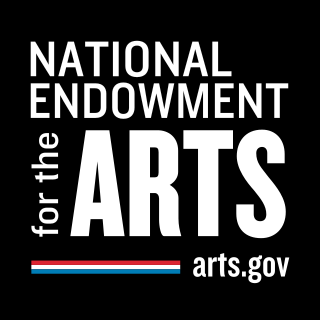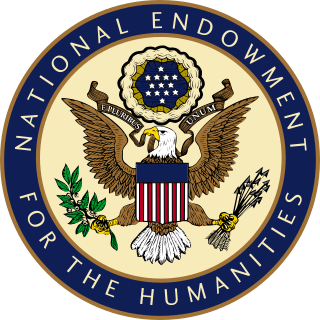Related Research Articles

The National Endowment for the Arts (NEA) is an independent agency of the United States federal government that offers support and funding for projects exhibiting artistic excellence. It was created in 1965 as an independent agency of the federal government by an act of the U.S. Congress, signed by President Lyndon B. Johnson on September 29, 1965. It is a sub-agency of the National Foundation on the Arts and the Humanities, along with the National Endowment for the Humanities, the Federal Council on the Arts and the Humanities, and the Institute of Museum and Library Services.

The National Endowment for the Humanities (NEH) is an independent federal agency of the U.S. government, established by the National Foundation on the Arts and the Humanities Act of 1965, dedicated to supporting research, education, preservation, and public programs in the humanities. The NEH is housed in the Constitution Center at 400 7th St SW, Washington, D.C. From 1979 to 2014, NEH was at 1100 Pennsylvania Avenue, N.W., Washington, D.C., in the Nancy Hanks Center at the Old Post Office.

The National Humanities Medal is an American award that annually recognizes several individuals, groups, or institutions for work that has "deepened the nation's understanding of the humanities, broadened our citizens' engagement with the humanities, or helped preserve and expand Americans' access to important resources in the humanities."

Family Home Entertainment (FHE) was an American home video company founded in 1980 by Noel C. Bloom. It was a division of International Video Entertainment, which had its headquarters in Newbury Park, California.
Resan is a 1987 documentary film by Peter Watkins, made between the years 1983 and 1985 on several continents, and structured around the theme of nuclear weapons, military spending and poverty. Ordinary people are asked about their awareness of these issues.
Isabel Glasser is an American actress. She has appeared in the films Forever Young (1992), Pure Country (1992), Mother (1996), Second Chances (1998) and Mentor (2006); and on television in several of the shows within the Law & Order franchise.

Equalizer 2000 is a 1987 action film shot in the Philippines.
William Reynolds Ferris Jr. is an American author and scholar and former chairman of the National Endowment for the Humanities. With Judy Peiser he co-founded the Center for Southern Folklore in Memphis, Tennessee; he was the founding director of the Center for the Study of Southern Culture at the University of Mississippi, and is co-editor of The Encyclopedia of Southern Culture.

The cinema of Somalia refers to the film industry in Somalia. The earliest forms of public film display in the country were Italian newsreels of key events during the colonial period. In 1937 the film Sentinels of Bronze was produced in Ogaden Somalia, with nearly all Somali actors. Growing out of the Somali people's rich storytelling tradition, the first few feature-length Somali films and cinematic festivals emerged in the early 1960s, immediately after independence. Following the creation of the Somali Film Agency (SFA) regulatory body in 1975, the local film scene began to expand rapidly. In the 1970s and early 1980s, popular musicals known as riwaayado were the main driving force behind the Somali movie industry. Epic and period films as well as international co-productions followed suit, facilitated by the proliferation of video technology and national television networks. In the 1990s and 2000s, a new wave of more entertainment-oriented movies emerged. Referred to as Somaliwood, this upstart, youth-based cinematic movement has energized the Somali film industry and in the process introduced innovative storylines, marketing strategies and production techniques.
Cambridge Information Group (CIG) is a privately held global investment firm focusing on information services, education and technology. It began as a firm providing services to academic publishers. It is headquartered in Bethesda, Maryland.
Somaliwood is an informal name for the Somali film industry that has developed in Columbus, Ohio, where a large Somali diaspora exists. Following the model of Bollywood, the name is a portmanteau of the words "Somali" and "Hollywood", the center of the American film industry.

Spark Media is an American independent multimedia and documentary production house based in Washington, D.C., United States.

Harry Huntt Ransom was a faculty member and administrator at the University of Texas, becoming the university's president in 1960, and ultimately served as the chancellor of the University of Texas System from 1961 to 1971.
The Jefferson Lecture in the Humanities is an honorary lecture series established in 1972 by the National Endowment for the Humanities (NEH). According to the NEH, the Lecture is "the highest honor the federal government confers for distinguished intellectual achievement in the humanities."
Abdulkadir Ahmed Said is a prominent Somali film director, producer, screenwriter, cinematographer and editor.

Why Men Leave Home is a 1924 American silent comedy-drama film directed by John M. Stahl directed and stars Lewis Stone and Helene Chadwick. Produced by Louis B. Mayer and released through First National Pictures, the film is based on the 1922 play of the same name by Avery Hopwood.

Striker is an Italian action film directed by Enzo G. Castellari. The film imitates the style of the Rambo movies.

Solomon Northup's Odyssey, reissued as Half Slave, Half Free, is a 1984 American television film based on the 1853 autobiography Twelve Years a Slave by Solomon Northup, a free black man who in 1841 was kidnapped and sold into slavery. The film, which aired on PBS, was directed by Gordon Parks with Avery Brooks starring as the titular character. It was the second film to be funded by the National Endowment for the Humanities, following A House Divided: Denmark Vesey's Rebellion in 1982. Parks returned to direct the film after years of absence. He chose to work in the Deep South and to collaborate with a crew of mixed races. The film first aired on PBS on December 10, 1984 and as part of PBS's American Playhouse anthology television series in the following year. It was released on video under the title Half Slave, Half Free.
John Kuo Wei Tchen, also known as Jack, is a historian of Chinese American history and the Inaugural Clement A. Price Chair in Public History and Humanities at Rutgers University.